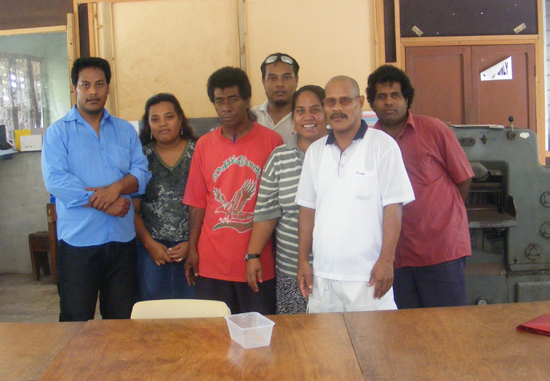
AUCKLAND (Pacific Scoop / Pacific Media Watch): Kiribati’s Communications Ministry has ordered the New Zealand-based Kiribati Independent newspaper to stop publishing and “respect our laws” while a Pacific media blog has challenged the move as a political gag.
Replying to a question by publisher and editor Taberannang Korauaba whether registration of the newspaper was being delayed for “hidden and political reasons”, spokesperson Ruata Titaake said it was the intention of the ministry to make all citizens obey the Newspaper Registration Act.
The fortnightly newspaper with a circulation of about 400 has been ordered to cease publication for the second time in five months.
Kiribati Independent, which also has an Auckland website, began publishing its print edition last December and applied to be registered and filed affidavits with the ministry in early April.
The blog Café Pacific, published by journalist and convenor of Pacific Media Watch media freedom monitoring project David Robie, challenged the delay in registration and questioned whether this was because of recent political exposes by the newspaper.
“Why is the Communications Ministry in Tarawa dragging its feet over registration for the Kiribati Independent newspaper? Five months waiting for registration and lots of confused messages in the process,” wrote Dr Robie on Café Pacific.
“Perhaps the answer is simple. Café Pacific understands the new newspaper with its Auckland-based online edition is a bit of a political embarrassment for President Anote Tong’s government.
“Twice the new newspaper has been ordered to stop publication since December while officials dither over the formalities under the Newspaper Registration Act.”
‘Different interpretations’
Korauaba told Pacific Media Watch the registration confusion was due to “different legal interpretations”.
He said legal advice had been that the newspaper was able to publish while the registration application was being processed.
“When I published Tematairiki [another publication], I just deposited affidavits and went ahead with the newspaper – there was no delay,” he said.
However, in the latest email to the newspaper today, Titaake said the application was still being processed.
“We found that your application for KI’s registration is still processing but yet your newsletters [have] kept publishing which means that you are disrespecting our Kiribati laws,” he said.
“Our part in this ministry as a civil officer is to ensure everything [is] in order and in line with the existing Act and that is why we keep reminding and advising you to follow the provisions in the Act for your registration.
“You may or may not intend to publish for political reasons but our intention is to encourage all our local publishers to obey and respect our own laws that govern all citizens of Kiribati.”
Business woman featured
According to the blog Café Pacific, the Kiribati Independent had “published stories featuring the reputed ‘richest woman in Kiribati’, New Zealander Joyce Lieven and her alleged relationship with the government. Businesswoman Joyce Lieven is daughter of the late NZ businessman Norman Lieven and reportedly a ‘close friend’ of the ruling party and President Tong.”
Another story made allegations about an AUD$80,000 a copra shelter contract on Teraina Island in the Line and Phoenix group.
President Tong reportedly threatened to sue the newspaper over allegations about a AUD$1 million junior secondary schools transport contract involving Joyce Lieven, claims denied by the national leader.
Earlier Pacific Media Watch report



